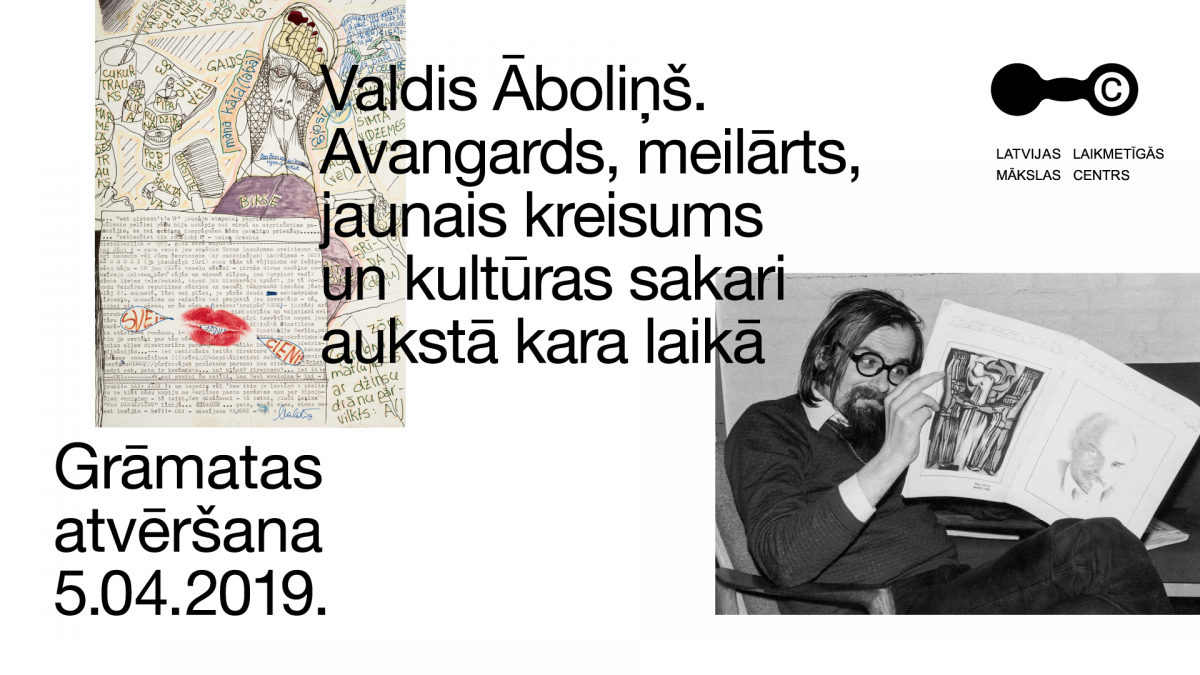
The Latvian Centre for Contemporary Art invites you to the launch of the book Valdis Āboliņš. The avant-garde, mailart, the New Left and cultural relations during the Cold War, on 5 April at 5 pm in the new building of the Art Academy of Latvia, Kalpaka Blvd 13. The event will include a presentation and a conversation between Valdis Āboliņš’ friends and contemporaries: Jānis Borgs, Mārtiņš Būmanis, Atis Lejiņš and Ojārs J. Rozītis.
At the centre of this voluminous (664 pages), bilingual (in Latvian and in English) book, is the creative and intellectual legacy of the curator and mail-artist Valdis Āboliņš (1939–1984), and his role in the history of Latvian art and exile in the years of the Cold War. The book includes his letters, writings and political cartoons, along with essays written by Āboliņš’ contemporaries and younger generation researchers about his activities in Western avant-garde art and his role in fostering cultural relations with Latvia. This book is not only about Valdis Āboliņš, but also about the role culture played in the relations between people on both sides of the Iron Curtain. Even though these were isolated worlds, there appeared some cracks, and V. Āboliņš was one of the protagonists who tried to establish contacts between Latvians in exile and in the occupied homeland. His ideas were considered radical, although he was driven by an idealistic desire to change political reality through culture.
The book gives an insight into the most important contexts in Valdis Āboliņš’ practice, the events and processes, and the flow and exchange of information in the Cold War era he stimulated, tying together the hitherto separate narratives of the Western and Eastern blocs. At the centre of the first chapter is avant-garde art from the 1960s, with a special focus on the Fluxus Festival of New Art in Aachen on 20 July 1964, which is is still remembered as one of the more politicized events of the post-war European avant-garde. It also introduces how Fluxus and the new art inspired Valdis Āboliņš to turn Aachen into a ‘centre of action art’, how culture impacted politicizing and his interests turned to the issue of cultural relations between Latvians in exile and Soviet Latvia. In the second part of the book, Valdis Āboliņš’ position regarding Latvian politics in exile in the late 60s and early 70s is explored. Inspired by critical theory, Valdis Āboliņš, along with other activists in exile, began discussions on the need to form contacts and develop cultural relations with Soviet-occupied Latvia and to bridge the gap between the two parts of the nation through politically active culture. The third chapter is devoted to Āboliņš’ activities in the 70s, when he became the executive secretary of the neue Gesellschaft für bildende Kunst – nGbK in West Berlin, where culture often played a political role, as well as in his contacts with Latvia. The exhibition 20 Realists from Soviet Latvia he organised in Düsseldorf (1973), and painter Maija Tabaka’s stay in West Berlin in 1977 were the most significant events in this cultural exchange.
The most elemental parts of this book are Valdis Āboliņš’ letters. They travelled both to like-minded correspondents in West Germany and elsewhere in the West and also to Latvia – the friendship through letters between him and several young intellectuals in Riga from the milieu of art, music and literature became the most lasting relations between the two separate worlds. These eccentric, densely informative and witty letters nowadays are an important source, both of his own creative activities and the cultural processes in the West and exile, and about ties with Latvia.
The compiler and editor of the book is art historian Ieva Astahovska who worked in collaboration with Antra Priede, and the authors of contextual essays are Ojārs J. Rozītis. Maruta Schmidt, Mark Allen Svede, Jānis Taurens, Ģirts Zēgners, Adam C. Oellers, Petra Stegmann and Barbara Straka. The book was designed by Alexey Murashko, and is published thanks to the financial support of Jānis and Dina Zuzāni and the State Culture Capital Foundation.
Book is available at our Online Store: https://lcca.lv/en/online-shop/